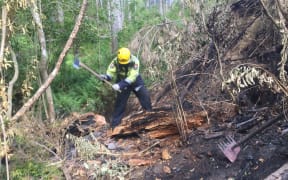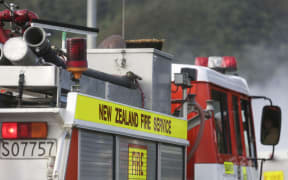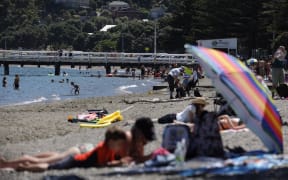As the country swelters through another day of heat, MetService explains why it's so hot, what's unusual about it - and when you might get some respite.

Ice cream is a must during the hot weather. Photo: RNZ / Rebekah Parsons-King
New Zealand is half way through a week of already record-breaking heat, with ice cream sales jumping, scrub fires breaking out and disruptions to rail services.
RNZ asked MetService meteorologist Lisa Murray about what's going on.
What is driving the heat and what conditions are making it possible?
"Well, we've all heard of the really big heat that they've had in Australia and that air mass has moved across the Tasman Sea to us. While we aren't getting the 45 or so degree heat that they had over there - thank goodness - [there is] a ridge of high pressure over the country bringing really settled weather, really light winds and it has stuck around for a few days. A combination of these conditions is giving us these really high temperatures."
Should we be surprised that these conditions are occurring?
"It's not unheard of, but it is unusual. And what's unusual about it is we're seeing prolonged heat. We're even talking five or six days in a row in this scenario - and that's when we're getting close to that definition of a heatwave stage.
"We do [usually] see days or even two days in a row where temperatures reach 30 or into the 30s, especially for those eastern parts of the country, but what we're seeing here is a prolonged heat in many areas, not just the usual hotspots … and this really warm, muggy heat overnight as well - temperatures ranging from 18 to 23 degrees in some places, which is really unusual."
Are those warm nights feeding into the daytime temperatures?
"Absolutely, all these things feed into each other. You can imagine if it doesn't cool down substantially overnight, when the daytime heat starts building up, instead of starting at six degrees you're starting at 20 degrees it is a substantial difference.
"How humid it is is also affecting how people are experiencing the heat."
What are those places that don't normally feel the heat for so long?
"Some of those place like Taumarunui, Te Kuiti, some of those inland places. They do see heat and they do get hot days, but this is really prolonged heat and quite a bit above their average temperatures."
What is an official heatwave?
"It needs to be five days in a row, five degrees above average. If you don't quite make that one day it resets. So we're watching that quite closely and it looks likely that some places will see it."
Which areas are likely to be the first to experience an official heatwave?
"Well there are some places that have seen four days already in a row of very high temperatures - the likes of the Hutt Valley in Wellington has been very warm in Wainuiomata, Masterton has been very warm, right up those East Coast areas, everyone is talking about Blenheim, Woodbourne as being really hot."
For some places, Thursday could be the day heatwave conditions are officially reached, she said.
"Regardless of whether it's an official heatwave at your place people are seeing some really warm temperatures, people are seeing the effect of the heat."
Is there an end in sight?
"Yes, there is - in the sense that there's a front moving up the country Friday into Saturday. That will move temperatures not to cold temperatures as such, but it will put them back into normal temperatures for this time of year, bearing in mind we're the middle of summer.
"It's getting back down to 19 to 22 area for a lot of places.
"That will come through for the weekend but there is a signal for some more warm temperatures next week so it will creep up again, hopefully for those sweltering places not as much."
Is such prolonged heat like this likely to be more common as climate change continues?
"It is something that the science shows, according to the world met organisation and the research done there and the research done at Niwa, we are going to see more extreme events in weather and temperature and this is something that we, as meteorologists, are keeping an eye on."
You can keep an eye on our updates about the heat here.






